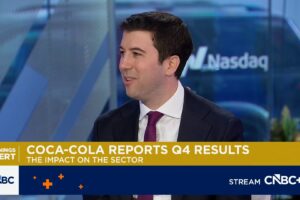
Asian markets made modest moves in early trading Wednesday, following losses on Wall Street as the U.S. Treasury yield curve inverted further.
An inverted yield curve indicates investors’ worries about the economy’s health, and has been a reliable indicator of a coming recession. On Tuesday, yields on U.S. 30-year bonds dipped below those for three-month notes, providing another red flag for the global economy.
Japan’s Nikkei NIK, +0.14% edged up 0.1% while South Korea’s Kospi 180721, +0.49% gained 0.5% as Japan’s downgrade of South Korea’s trade status took effect. Trade tensions between the two countries have been rising, and in a tit-for-tat move, South Korea’s downgrade of Japan’s trading status is expected to kick in next month.
Hong Kong’s Hang Seng Index HSI, +0.05% was last about flat, while the Shanghai Composite SHCOMP, -0.33% declined 0.3%. Benchmark indexes in Taiwan Y9999, +0.38% , Singapore STI, +0.14% , Malaysia FBMKLCI, -0.05% and Indonesia JAKIDX, +0.13% were mixed. Australia’s S&P/ASX 200 XJO, +0.30% inched up 0.3%.
Among individual stocks, e-commerce company Rakuten 4755, -5.43% slid in Tokyo trading, while IT provider NEC 6701, +1.86% and Tokyo Electric Power 9501, +2.64% gained. In Hong Kong, Sunny Optical 2382, +0.58% and oil producer CNOOC 883, +1.46% rose, while Tencent 700, -1.29% declined. LG Electronics 066570, +1.35% and Hyundai Motor 005380, +2.00% gained in South Korea, and Foxconn 2354, -1.27% fell in Taiwan. In Australia, Rio Tinto RIO, +2.35% and Beach Energy BPT, +1.79% advanced.
Investors are “finding it difficult to put a finger as to where the ongoing U.S.-China trade issue is headed,” said Jingyi Pan of IG in a report. “The saying that we are a tweet (from Trump) away from the next trade escalation between U.S. and China had certainly grown to become the broad view.”
On Wall Street, investors shifted money from stocks to U.S. government bonds, gold and other traditional safe-haven assets.
UBS, the largest wealth manager in the world, recommended that customers reduce their exposure to stocks, the first time the bank has done so since the depths of Europe’s debt crisis in 2012.
The benchmark S&P 500 index SPX, -0.32% fell 0.3% to 2,869.16. The Dow Jones Industrial Average DJIA, -0.47% dropped 0.5% to 25,777.90. The Nasdaq COMP, -0.34% slid 0.3% to 7,826.95.
U.S. and Chinese trade negotiators are due to meet next month in Washington, but neither side has given any indication of offering concessions to break a deadlock. A round of talks last month in Shanghai ended with no sign of progress.
Washington and Beijing fueled investor pessimism on Friday with an additional round of tit-for-tat tariff hikes. Their punitive duties on billions of dollars of each other’s goods already have battered exporters on both sides and prompted forecasters to cut economic growth outlooks.
“There are no grounds to believe China will concede to a deal based on unilateral, lopsided demands under rising tariffs duress,” said Mizuho Bank in a report.
Benchmark U.S. crude CLV19, +1.02% gained 56 cents to $55.49 per barrel in electronic trading on the New York Mercantile Exchange. The contract rose $1.29 on Tuesday to close at $54.93. Brent crude BRNV19, +0.74% , used to price international oils, added 41 cents to $59.44 per barrel in London. It advanced 91 cents the previous session to $59.03.
The dollar USDJPY, +0.08% advanced to 105.84 yen from Tuesday’s 105.76 yen.











